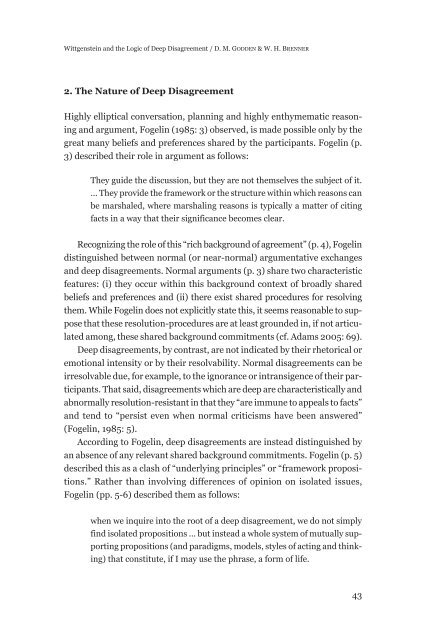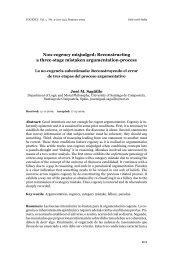Cogency v2 n2
Cogency v2 n2
Cogency v2 n2
You also want an ePaper? Increase the reach of your titles
YUMPU automatically turns print PDFs into web optimized ePapers that Google loves.
Wittgenstein and the Logic of Deep Disagreement / D. M. GODDEN & W. H. BRENNER<br />
2. The Nature of Deep Disagreement<br />
Highly elliptical conversation, planning and highly enthymematic reasoning<br />
and argument, Fogelin (1985: 3) observed, is made possible only by the<br />
great many beliefs and preferences shared by the participants. Fogelin (p.<br />
3) described their role in argument as follows:<br />
They guide the discussion, but they are not themselves the subject of it.<br />
… They provide the framework or the structure within which reasons can<br />
be marshaled, where marshaling reasons is typically a matter of citing<br />
facts in a way that their significance becomes clear.<br />
Recognizing the role of this “rich background of agreement” (p. 4), Fogelin<br />
distinguished between normal (or near-normal) argumentative exchanges<br />
and deep disagreements. Normal arguments (p. 3) share two characteristic<br />
features: (i) they occur within this background context of broadly shared<br />
beliefs and preferences and (ii) there exist shared procedures for resolving<br />
them. While Fogelin does not explicitly state this, it seems reasonable to suppose<br />
that these resolution-procedures are at least grounded in, if not articulated<br />
among, these shared background commitments (cf. Adams 2005: 69).<br />
Deep disagreements, by contrast, are not indicated by their rhetorical or<br />
emotional intensity or by their resolvability. Normal disagreements can be<br />
irresolvable due, for example, to the ignorance or intransigence of their participants.<br />
That said, disagreements which are deep are characteristically and<br />
abnormally resolution-resistant in that they “are immune to appeals to facts”<br />
and tend to “persist even when normal criticisms have been answered”<br />
(Fogelin, 1985: 5).<br />
According to Fogelin, deep disagreements are instead distinguished by<br />
an absence of any relevant shared background commitments. Fogelin (p. 5)<br />
described this as a clash of “underlying principles” or “framework propositions.”<br />
Rather than involving differences of opinion on isolated issues,<br />
Fogelin (pp. 5-6) described them as follows:<br />
when we inquire into the root of a deep disagreement, we do not simply<br />
find isolated propositions … but instead a whole system of mutually supporting<br />
propositions (and paradigms, models, styles of acting and thinking)<br />
that constitute, if I may use the phrase, a form of life.<br />
43








